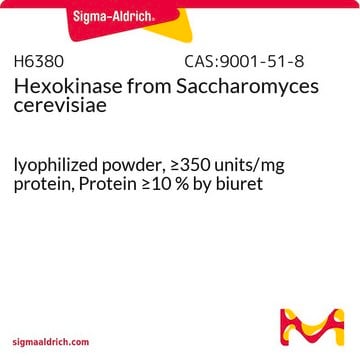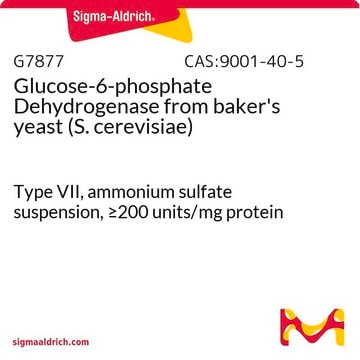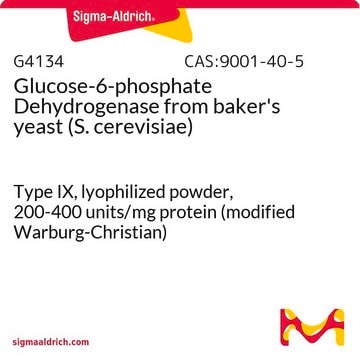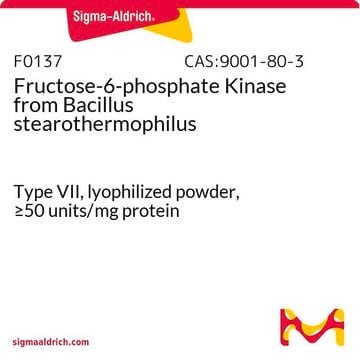H4502
Hexokinase from Saccharomyces cerevisiae
Type F-300, lyophilized powder, ≥130 units/mg protein (biuret)
Sinónimos:
Hexokinase D, Hexokinasetype IV, ATP:D-Hexose-6-phosphotransferase, Hexokinase from yeast
About This Item
Productos recomendados
biological source
Saccharomyces cerevisiae
Quality Level
type
Type F-300
form
lyophilized powder
specific activity
≥130 units/mg protein (biuret)
mol wt
110 kDa
purified by
crystallization
storage condition
(Keep container tightly closed in a dry and well-ventilated place)
color
white
anion traces
sulfate (SO42-): free
foreign activity
ATPase, myokinase, glucose-6-phosphate dehydrogenase, 6-phosphogluconic dehydrogenase and phosphoglucose isomerase ≤0.01%
storage temp.
−20°C
Gene Information
bakers yeast ... HXK1(850614) , HXK2(852639)
¿Está buscando productos similares? Visita Guía de comparación de productos
General description
The hexokinase 1 (HXK1) gene is mapped to the Saccharomyces cerevisiae chromosome VI. HXK1 is ubiquitously expressed in mammalian tissues and is abundant in the brain, erythrocytes, lymphocytes, and fibroblasts.
Application
- for digesting glucose for measuring glucose content in the root and stem samples of Quercus velutina
- to treat ADP (adenosine diphosphate) solution along with D-glucose to remove the contaminating ATP (adenosine triphosphate)
- in 4-(2-hydroxyethyl)-1-piperazineethanesulfonic acid buffer (pH 7.5) for ADP-[13CU]glucose synthesis
Biochem/physiol Actions
The rate of phosphorylation varies with different hexoses (pH 7.5, 30 °C).
D-fructose KM: 0.33 mM
D-glucose KM: 0.12 mM
D-mannose KM: 0.05 mM
Yeast hexokinase exists as two similar isoforms, PI and PII (A and B), with isoelectric points of 5.25 and 4, respectively.
Molecular Weight: ~ 54 kDa (monomer)
~110 kDa (dimer)
Optimal pH: 7.5 to 9.0
Extinction Coefficient: E1% = 8.85 (PI) and 9.47 (PII) at 280 nm
Activators: Hexokinase requires Mg2+ ions (KM = 2.6 mM) for activity. Hexokinase is activated by catecholamines and related compounds.
Inhibitors: sorbose-1-phosphate, polyphosphates, 6-deoxy-6-fluoroglucose, 2-C-hydroxy-methylglucose, xylose, lyxose, and thiol reactive compounds (Hg2+ and 4-chloromercuribenzoate)
Quality
Unit Definition
Physical form
Reconstitution
Related product
Storage Class
11 - Combustible Solids
wgk_germany
WGK 3
flash_point_f
Not applicable
flash_point_c
Not applicable
ppe
Eyeshields, Gloves, type N95 (US)
Elija entre una de las versiones más recientes:
Certificados de análisis (COA)
¿No ve la versión correcta?
Si necesita una versión concreta, puede buscar un certificado específico por el número de lote.
¿Ya tiene este producto?
Encuentre la documentación para los productos que ha comprado recientemente en la Biblioteca de documentos.
Los clientes también vieron
Protocolos
Measure hexokinase activity using a continuous spectrophotometric rate-determination assay at 340 nm, catalyzing D-hexose sugar phosphorylation using ATP.
Measure hexokinase activity using a continuous spectrophotometric rate-determination assay at 340 nm, catalyzing D-hexose sugar phosphorylation using ATP.
Measure hexokinase activity using a continuous spectrophotometric rate-determination assay at 340 nm, catalyzing D-hexose sugar phosphorylation using ATP.
Measure hexokinase activity using a continuous spectrophotometric rate-determination assay at 340 nm, catalyzing D-hexose sugar phosphorylation using ATP.
Nuestro equipo de científicos tiene experiencia en todas las áreas de investigación: Ciencias de la vida, Ciencia de los materiales, Síntesis química, Cromatografía, Analítica y muchas otras.
Póngase en contacto con el Servicio técnico








